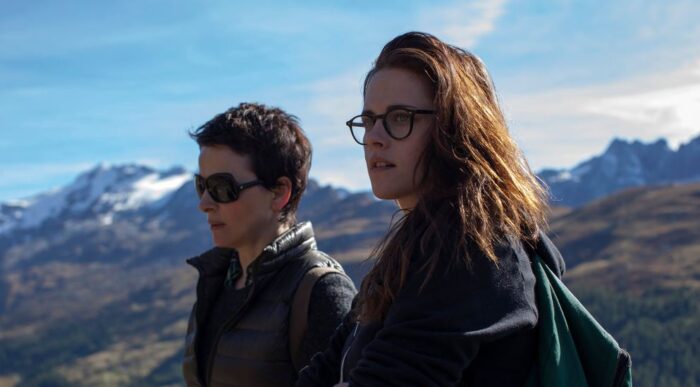
If there was ever a film that felt genetically engineered to play exclusively at European film festivals, it’s Olivier Assayas’ Clouds of Sils Maria. Like, I’m passionate about complex characters in fiction, but not like Juliette Binoche’s Maria. That’s the distance I feel with Maria, an acclaimed film and stage actress, grappling with the defining work of her career and how it relates to her age. I’m not an actor, but I can never imagine becoming so entwined with my art that it feels like torture. That must be why they call them “tortured artists.”
Kristen Stewart plays Maria’s assistant, Valentine, who has a more optimistic view of Maria’s character. Now I realize she is the audience surrogate—a fan who sees the power of the stage and screen as a force of positivity. It’s these two conflicting ideals that drive the dramatic back and forth of the film and made me weigh whether or not I liked this film. I did, but it’s hard when one of the characters feels pretentious in a way I’ll never be or understand. Regardless, it’s a rich text; let’s dive deeper.
Maria Enders, who feels like a surrogate for Juliette Binoche herself, is traveling with her assistant Valentine to accept an award in Zurich on behalf of legendary Swiss playwright Wilhelm Melchior. Twenty years earlier, Melchior cast Maria in the play and film version of a story called “Maloja Snake”. In the play, Maria played a young woman named Sigrid who has an affair with an older woman, Helena. Sigrid later dumps Helena, leading Helena to kill herself.
Tragedy strikes when Valentine informs Maria that Wilhelm has died at his house in Sils Maria, Switzerland. The trip turns into a memorial tour of sorts, and Maria is forced to come to terms with getting older, despite still feeling young. She also grapples with what this newfound taste of mortality means for her as an actress and a person. Maria is approached to star in a revival of Maloja Snake, but this time as the older female lead, Helena, while Jo-Ann Ellis (Chloë Grace Moretz), a controversial up-and-comer and favorite of the tabloids, takes Maria’s former role.
To prepare for her role, Maria and Valentine stay at Wilhelm’s home in Sils Maria to run lines. Maria and Valentine bond, but they also argue about what the roles represent and the deeper meaning of the play. The bulk of the film follows these two as they converse and take in the scenic mountains of Sils Maria. The film is shot beautifully, and the performances are equally stunning. Even if I didn’t always like Maria as a character, I still enjoyed Binoche’s performance.
The dynamic between Valentine and Maria is an obvious counterpart to the characters in the play within the film, which is a little on the nose for me, but it does provide good discussions. I also don’t buy the fictional movies we see Chloë Grace Moretz’s character star in within the film, nor do I believe in who her character could be compared to in reality.
I feel detached from this film. Whereas the last film I reviewed, Take Out, felt completely real, Clouds of Sils Maria does not. It is a movie, but there’s nothing wrong with that. A film is a medium like a play or book or whatever, to have a conversation or express an idea. Whether the viewer fully acclimates to the way in which that story is told is subjective. Or maybe, the movie lacks subtely on purpose? Nothing wrong with that either. I don’t know. You’ll have to ask a tortured artist.

